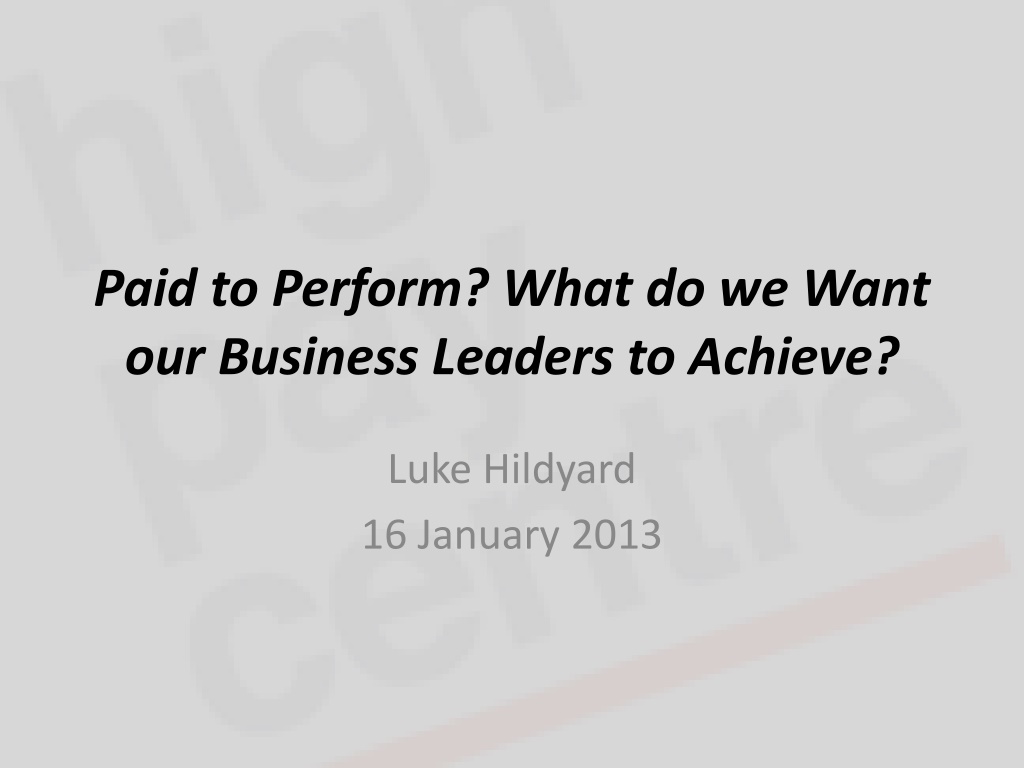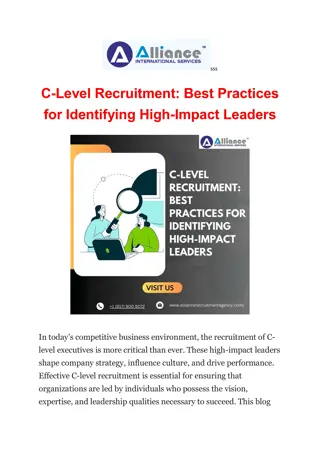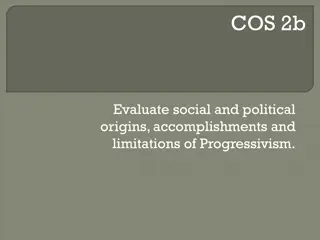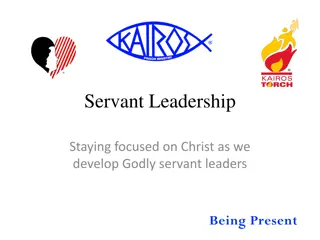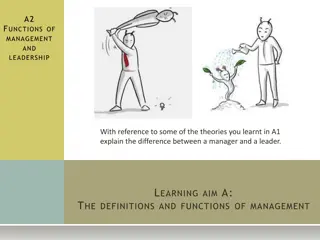What Business Leaders Need to Achieve
Reduce inequalities, focus on the long-term, build a sustainable economy - these are key goals business leaders should aim for. Addressing short-termism and shareholder risks are essential in achieving these targets.
Download Presentation

Please find below an Image/Link to download the presentation.
The content on the website is provided AS IS for your information and personal use only. It may not be sold, licensed, or shared on other websites without obtaining consent from the author.If you encounter any issues during the download, it is possible that the publisher has removed the file from their server.
You are allowed to download the files provided on this website for personal or commercial use, subject to the condition that they are used lawfully. All files are the property of their respective owners.
The content on the website is provided AS IS for your information and personal use only. It may not be sold, licensed, or shared on other websites without obtaining consent from the author.
E N D
Presentation Transcript
Paid to Perform? What do we Want our Business Leaders to Achieve? Luke Hildyard 16 January 2013
PAID TO PERFORM? What do we want our business leaders to achieve? Prem Sikka (prems@essex.ac.uk) Professor of Accounting, Essex Business School, UK and Director, Association for Accountancy & Business Affairs (AABA) www.aabaglobal.org 2
Paid to Perform? What do we want our business leaders to achieve? Reduce Inequalities Democracy at Work Focus on the long-term Build a sustainable economy Equitable distribution of income/wealth is the key Inequitable distribution is a major cause of the economic crisis. 3
Paid to Perform? SHORT-TERMISM The average duration of shareholding in UK- listed companies has fallen from about five years in the mid-1960s and about two years in the 1980s to about 7.5 months at the end of 2007. The average shareholding periods for US and UK banks fell from around 3 years in 1998 to around 3 months by 2008 4
Paid to Perform? SHAREHOLDERS AS ARE NOT THE MAIN RISK-BEARERS Leverage Ratios Barclays 24 times HSBC 21 times Lloyds 18 times Lehman Brothers 30 times Bear Stearns 33 times Northern Rock 50 times Shareholders are neither the owners, nor the main risk-bearers. 5
Paid to Perform? Australian two-strikes law if 25% or more of votes cast at two consecutive AGMs oppose the adoption of a remuneration report, then the company must formally respond by asking all board members except the managing director to stand for re-election within 90 days. 6
Paid to Perform? FTSE 350 CEOs Tenure 4 years and declining Remunerations schemes often based on short- term measures. Yes, link remuneration to long-term performance Need more effective information and disclosures BUT CSR has also become a PR vehicle. 7
Paid to Perform? Are there better standards: Human Rights? They apply to all states and corporations Need more public information about corporate contract with society Quality of profits FDI contracts Tax payments Pollution Relationship with local elites 8
Paid to Perform? EMPLOYEES AND OTHER STAKEHOLDERS MUST HAVE A BINDING VOTE ON EXECUTIVE REMUNERATION AN ADVISORY VOTE DOES NOT EMPOWER Executive remuneration contracts to be publicly available. 9
Paid to Perform? The UK was instrumental in developing the German system of corporate governance: Two-tier boards Workers on company boards Works councils Scandinavian countries also build on employees Why does the same not happen in the UK? 10
Paid to Perform? THANK YOU 11
Findings 94 FTSE 100 companies use EPS or TSR to calculate their LTIP TSR used by 74 companies to calculate at least part of PRP (64 companies used EPS) Only 38 companies use specific, measurable non- financial PRP criteria. Only 7 for LTIPs Most progressive companies have generally undergone massive scandal BP & the Banks COMPANY PERFORMANCE OVERWHELMINGLY JUDGED BY PROFIT/SHARE PRICE
Accountancy-based measures (like EPS) Company accounts are inevitably based on a series of assumptions about the future accounts provide precise indicators of performance only in as much as they apply precise rules to a set of uncertain events (Andrew Likierman, London Business School) Market-based measures (like TSR) the market s collective view was that risks to bank creditworthiness had fallen steadily between 2002 and 2007, reaching a historic low in the early Summer of 2007, the very eve of the worst financial crisis in 70 years (Lord Adair Turner) PROFIT/SHARE PRICE UNRELIABLE GUIDES TO COMPANY PERFORMANCE
Critical measures of performance: Companies as enduring social institutions Employee engagement Brand/ reputation The value that a company creates should be measured not just in terms of short- term profits, but how it sustains the conditions that enable it to flourish over time Rosabeth Moss Kanter, Harvard Business Review Corporate social performance Customer satisfaction BEST INDICATORS OF LONG-TERM, SUSTAINABLE SUCCESS ARE NON-FINANCIAL
Manifestation of short-term share price/ profit orientation Action Ruthless cost-cutting Debt-fuelled peculation and acquisition Share buyback (quadrupled in UK since mid-90s) Reduced business investment (lower in UK than France, Germany & US) Impact SHORT-TERM FINANCIAL PERFORMANCE CAN COME AT THE COST OF LONG-TERM SUSTAINABILITY
Grounds for Action Taxpayer bears cost of CO2 emissions/inequality Volatile business environment affects public finances Millions of people depend on big companies as employer/supplier Taxpayer is multi-billion/ customer of big business through procurement budget Taxpayer contributes 32% of UK R&D funding, & funds other critical infrastructure PRACTICAL & MORAL BASIS FOR WIDER INPUT INTO EXEC/COMPANY OBJECTIVES
Recommendations 1) Non-financial measures should constitute 50% of PRP 2) Companies should disclose Environmental/Social performance 3) Tax rates and procurement decisions should favour environmental/social disclosers 4) Investment chain should be required to consider social/environmental impact 5) Employee representation on boards EXECUTIVE/COMPANY PERFORMANCE MUST BE UNDERSTOOD AND EVALUATED IN A WAY THAT REFLECTS ALL STAKEHOLDER INTERESTS
PAID TO PERFORM? What do we want our business leaders to achieve? Prem Sikka (prems@essex.ac.uk) Professor of Accounting, Essex Business School, UK and Director, Association for Accountancy & Business Affairs (AABA) www.aabaglobal.org 18
Paid to Perform? What do we want our business leaders to achieve? Reduce Inequalities Democracy at Work Focus on the long-term Build a sustainable economy Equitable distribution of income/wealth is the key Inequitable distribution is a major cause of the economic crisis. 19
Paid to Perform? SHORT-TERMISM The average duration of shareholding in UK-listed companies has fallen from about five years in the mid-1960s and about two years in the 1980s to about 7.5 months at the end of 2007. The average shareholding periods for US and UK banks fell from around 3 years in 1998 to around 3 months by 2008 20
Paid to Perform? SHAREHOLDERS AS ARE NOT THE MAIN RISK-BEARERS Leverage Ratios Barclays 24 times HSBC 21 times Lloyds 18 times Lehman Brothers 30 times Bear Stearns 33 times Northern Rock 50 times Shareholders are neither the owners, nor the main risk-bearers. 21
Paid to Perform? Australian two-strikes law if 25% or more of votes cast at two consecutive AGMs oppose the adoption of a remuneration report, then the company must formally respond by asking all board members except the managing director to stand for re-election within 90 days. 22
Paid to Perform? FTSE 350 CEOs Tenure 4 years and declining Remunerations schemes often based on short-term measures. Yes, link remuneration to long-term performance Need more effective information and disclosures BUT CSR has also become a PR vehicle. 23
Paid to Perform? Are there better standards: Human Rights? They apply to all states and corporations Need more public information about corporate contract with society Quality of profits FDI contracts Tax payments Pollution Relationship with local elites 24
Paid to Perform? EMPLOYEES AND OTHER STAKEHOLDERS MUST HAVE A BINDING VOTE ON EXECUTIVE REMUNERATION AN ADVISORY VOTE DOES NOT EMPOWER Executive remuneration contracts to be publicly available. 25
Paid to Perform? The UK was instrumental in developing the German system of corporate governance: Two-tier boards Workers on company boards Works councils Scandinavian countries also build on employees Why does the same not happen in the UK? 26
Paid to Perform? THANK YOU 27
